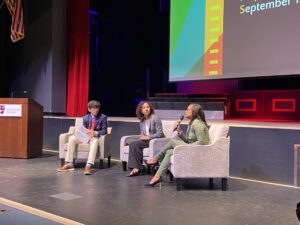October 16, 2024
Celebrating Hispanic Heritage Month: Cultural Values, Resilience, & Community Building
At an assembly marking the end of Hispanic Heritage Month, two parents of Hispanic heritage shared a powerful conversation on their cultural identity moderated by Daniel Rivera ’27, the values that have shaped their lives, and how they continue to influence their careers and community roles: Elsie Gonzalez P’ 26, 28, director of diversity, equity, and inclusion at Capitol Region Education Council (CREC) and Sinthia Sone-Moyano P’26, deputy commissioner for educational supports and wellness. Each spoke passionately about family, education, and the importance of representation, inspiring students with their stories of perseverance and success.

Gonzalez reflected on how her mixed-race identity shaped her life perspective. Growing up, she shared, she didn’t fully appreciate her cultural roots, as the pressures of assimilation often took precedence. However, as she matured, she realized that her Puerto Rican heritage was deeply woven into her identity. “Hopefully, I learned that a lot of the things that made me who I am as a person were really rooted in the cultural values that my family brought to this country,” Gonzalez said. Central to her values was the idea of “family first”—staying connected to traditions, culture, and language. She recounted how her parents’ limited English fluency initially caused embarrassment. But over time, she embraced her bilingualism and biculturalism as strengths, appreciating how these aspects enriched her life. “Being bilingual, bicultural, and biracial is an asset to who I am as a person,” she said.
Sone-Moyano, an Afro-Latina of Dominican descent, shared a similar story of family values and cultural pride. Born and raised in Connecticut, she recounted how her parents immigrated from the Dominican Republic in the 1970s, fleeing the dictatorship of Rafael Trujillo. Growing up in a household where her paternal grandmother, the family matriarch, lived with them, she learned about her cultural heritage through storytelling and day-to-day interactions, giving her a sense of identity and direction. “A lot of history and knowledge was instilled in me,” she said. “When you know where you come from and you’re rooted in that at a very young age, and understanding how your ancestors could achieve what they did with what they had was instrumental. So, with that, education was always at the forefront. As a first-generation college student, she was determined to seize the opportunities that her parents did not have.
Both speakers emphasized how their cultural values influenced their career paths. Gonzalez spoke about her commitment to creating opportunities for marginalized students, especially those from the Latino community. “Every job I have had has been connected to first-generation students, Latino students, and Latina students,” she said. “I have helped folks who have not had access to specific opportunities.” She said she works to restore spaces where individuals need to work on learning about communities of color and communities they don’t have proximity to. Her job, she said, is to disrupt the status quo and dig deeper into conversations when people are in conflict.Her role involves advocating for equality, addressing racism and prejudice, and fostering spaces where communities of color can thrive. Representation, she explained, is key. When young students see someone like her in leadership positions, it shows them that they, too, can succeed.
Sone-Moyano echoed these sentiments. She described her role overseeing education for thousands of students in Connecticut, many of whom are from marginalized communities or are multilingual learners. Her mission, guided by the values instilled in her as a child, is to remove barriers to education and create opportunities for all students, regardless of background. “I have to make sure that I’m removing barriers and also making sure that everyone has access to quality education, specifically those that come from the most marginalized communities,”
The assembly concluded with a call to action: How can we use our voices to uplift the Hispanic and Latino communities? Both speakers encouraged the audience to live their values, create opportunities for others, and challenge the status quo. They reminded students that Hispanic Heritage Month is not just about celebrating during one month of the year but about continuous engagement with and support for Latino communities.
Through their words, the speakers underscored the importance of embracing one’s heritage, using education as a tool for empowerment, and fostering inclusivity and equity. Their personal stories of resilience and cultural pride served as a powerful reminder of the vital role Hispanic heritage plays in shaping individual identities and communities.
